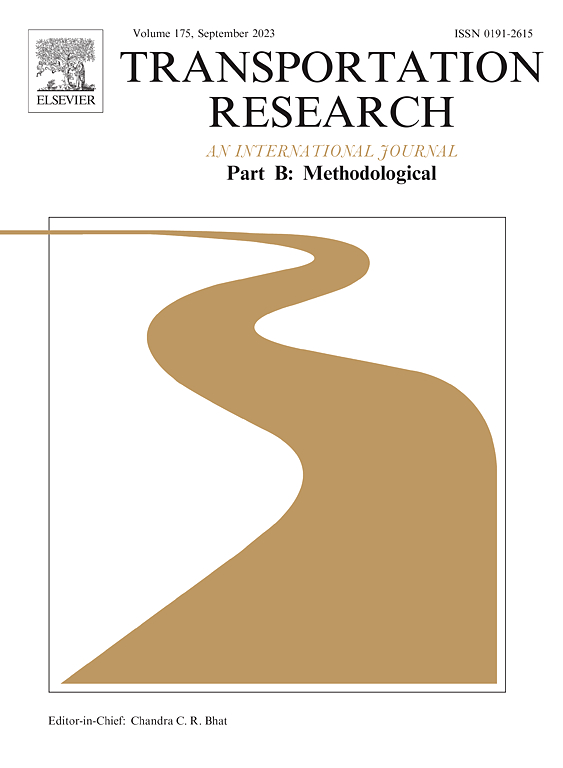为缓解交通拥堵向自动驾驶汽车提供实时路径建议:双向深度强化学习方法
IF 5.8
1区 工程技术
Q1 ECONOMICS
引用次数: 0
摘要
本研究探讨了在互联自动驾驶汽车(CAV)系统中提供信息以减少拥堵的有效性。CAV 的固有优势,如车对车通信、先进的车辆自主性和较少的人工参与,使其有利于实现相关均衡(CE)。利用这些优势,本研究提出了一个涉及 CAV 和信息提供者的强化学习框架,其中 CAV 进行实时学习,以最大限度地减少各自的旅行时间,而信息提供者则提供实时路线建议,以最大限度地减少系统的总旅行时间。CAV 的途中路线选择问题被表述为马尔可夫博弈,信息提供问题被表述为单代理马尔可夫决策过程。然后,本研究开发了一种定制的双向深度强化学习方法,以解决这些相互关联的问题,同时考虑到它们的独特性。此外,CE 也是在所提出的框架内制定的。理论分析严格证明了 CE 的实现,并证明所提出的框架可以有效缓解拥堵,同时不影响单个用户的最优性。数值结果证明了这种方法的有效性。我们的研究以 CE 为理论基础,缓解了系统级目标和个人级目标之间的冲突,为推进 CAV 系统中的拥堵缓解策略做出了贡献。研究结果凸显了信息提供在促进无人驾驶汽车之间的协调和相关性方面的潜力,从而提高交通效率,实现智能交通的系统级目标。本文章由计算机程序翻译,如有差异,请以英文原文为准。
Providing real-time en-route suggestions to CAVs for congestion mitigation: A two-way deep reinforcement learning approach
This research investigates the effectiveness of information provision for congestion reduction in Connected Autonomous Vehicle (CAV) systems. The inherent advantages of CAVs, such as vehicle-to-everything communication, advanced vehicle autonomy, and reduced human involvement, make them conducive to achieving Correlated Equilibrium (CE). Leveraging these advantages, this research proposes a reinforcement learning framework involving CAVs and an information provider, where CAVs conduct real-time learning to minimize their individual travel time, while the information provider offers real-time route suggestions aiming to minimize the system’s total travel time. The en-route routing problem of the CAVs is formulated as a Markov game and the information provision problem is formulated as a single-agent Markov decision process. Then, this research develops a customized two-way deep reinforcement learning approach to solve the interrelated problems, accounting for their unique characteristics. Moreover, CE has been formulated within the proposed framework. Theoretical analysis rigorously proves the realization of CE and that the proposed framework can effectively mitigate congestion without compromising individual user optimality. Numerical results demonstrate the effectiveness of this approach. Our research contributes to the advancement of congestion reduction strategies in CAV systems with the mitigation of the conflict between system-level and individual-level goals using CE as a theoretical foundation. The results highlight the potential of information provision in fostering coordination and correlation among CAVs, thereby enhancing traffic efficiency and achieving system-level goals in smart transportation.
求助全文
通过发布文献求助,成功后即可免费获取论文全文。
去求助
来源期刊
CiteScore
12.40
自引率
8.80%
发文量
143
审稿时长
14.1 weeks
期刊介绍:
Transportation Research: Part B publishes papers on all methodological aspects of the subject, particularly those that require mathematical analysis. The general theme of the journal is the development and solution of problems that are adequately motivated to deal with important aspects of the design and/or analysis of transportation systems. Areas covered include: traffic flow; design and analysis of transportation networks; control and scheduling; optimization; queuing theory; logistics; supply chains; development and application of statistical, econometric and mathematical models to address transportation problems; cost models; pricing and/or investment; traveler or shipper behavior; cost-benefit methodologies.

 求助内容:
求助内容: 应助结果提醒方式:
应助结果提醒方式:


